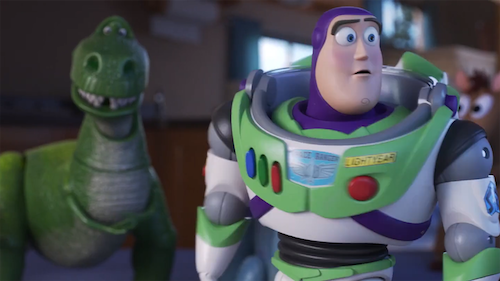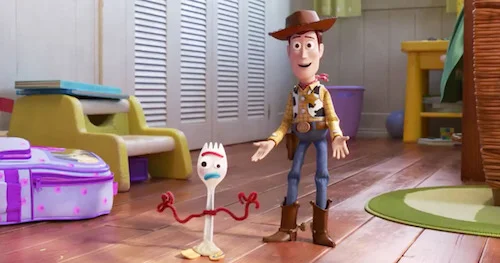Toy Story 4: Should It Exist?
So the trailer and newest poster for Toy Story 4 has finally been revealed. We have been given an in depth look at the most anticipated animated film of the year (outside of Frozen 2 if you’re a parent or child, of course). The biggest concern people have had with this latest instalment is whether or not it even needs to exist. Toy Story 3 was dark, riveting, and emotional. Most of all, it was a strong send off. We saw Andy giving up his toys to a new child. He is no longer the person-of-affection for these toys. They nearly died, but they stuck together and now have a new life. Did we need a fourth?
Now that the most revealing (almost too revealing) footage is out, I will make an argument that it at least seems like a great effort. Will it work out? We will have to see. Right now, I can at least see why this appendix was so urgent to be told. We have the same story we've had the first three times: toys are separated from their owners, and they have to make their way back to continue being an influence on these kids' lives. The first time, Woody and Buzz had to find their way back. The second film had Al's Toy Barn as a labyrinth. The third featured a prison in the form of a kindergarten class.
Now, we see both the afterlife and a fresh start. There is an antique shop that had accepted old "play things" that the world has no use for; either a retirement home or hell, if you will. Then there are two forms of integration into a child's life that are introduced here. There is the carnival, that hands out plush toys as prizes (which is clearly used as a haven for toys to get access to many children). There is also a fresh idea: toys can be made by children. Forky was created by Bonnie (a child; the child we saw Andy give his toys to last time), and his very existence is one the is unsure of. Why is he here? Why is he not serving his purpose as a utensil?
In Toy Story 1, we searched for identity (am I a toy? Whose toy am I?). In 2, we observed belonging (where is our home?). In 3, there was hierarchy and a struggle for order (why do we serve children or other toys?). Finally, we have found existentialism. Why do we even exist? Sporky did not wish to be made. Woody did not wish to be gifted away. Bo Peep did not wish to be sold. These are toys that were placed in environments that removed their notion of identity, belonging and order. Woody is no longer Andy's. If he can be a toy for any child, why isn't he a toy for more children? We've seen Woody be tossed around the most, between being replaced (Buzz), discovered (Jessie and Stinky Pete), and even the face of death (the toy that leads the charge into the furnace).
This is because Andy's first favourite toy was Woody. Andy cared about where Woody was as a child, and what happened to him as an adult. Toy Story 4 exists, because it is only natural that Andy will think about the toys in their new home. Why is a kitchen utensil only alive when it becomes a toy? Because this is a toy story: the opportunity to be children again where our play things could interact with each other through our imaginations. This is clearly through an imaginary perspective, not even in a metaphorical sense; this is an animated feature created by adults showcasing a magical world through the eyes of dolls and figures.
If you want to believe this is through Andy's mind, you can see why he is worrying about his childhood memories. If you take this literally (these are toys that do live and serve to bring kids joy), then this is a look at toys that no longer know for sure where they live (and for who). A spork with googly eyes and pipe cleaner hands is a new member of the group, and questions are raised. In 2019, where many personal life decisions or identities from birth are questioned through insensitivity, this spork serves a very strong purpose. Removing politics, this is the start of a thread: stubborn toys that question their worth if new ideas threaten them. If toys can be created by children, and also passed on to other children, what does it mean to actually be a toy?
This is why Toy Story 4 could be brilliant. Sure, we've seen the breathtaking moment where the toys are passed on to a new generation. Now, we are going one step further in an extremely daring way. The plot could be basic and formulaic, but the depth is actually quite risky. These characters we have loved for twenty years are now beginning to discuss their own value in life. This is one step beyond the last time we saw our childhoods. This is the great beyond, the kind we never even thought about until this sentence, maybe.
If the film is bad, it will definitely be a blemish on a near-perfect trilogy. The leap does deserve to be taken with this powerful concept. Let's be honest. Toy Story 2 or 3 weren't supposed to exist when the first film came out. Look at how Godfather 2 was always meant to compliment the first feature; compare that to how limp the third film -- which was made to make up money for Apocalypse Now, which was forever lost -- was. The Lord of the Rings trilogy was perfect because it was made to be a trilogy. The strung-out Hobbit series suffers in comparison. Most great series were meant to be series from the very start.
Somehow, Toy Story has defied the odds. Maybe there will come a day where one-too-many gambles takes place. Maybe this fourth instalment is that day. Maybe it isn't. We have two sequels that somehow were even better than the first film to look at as key examples of Toy Story thankfully not knowing when to quit. It should have just been a single film. Actually, two is fine, but a trilogy never works. Okay, we have a great trilogy now, but a fourth is absolutely not needed. That last sentiment is probably because of how powerfully concluded the trilogy seemed. We’ve also seen Pixar stumble with sequels after Toy Story 3: Cars 2 and 3 were low points, and Monsters University and Finding Dory were sweet but not essential. We know Pixar is no longer perfect, but they are still capable of greatness (Inside Out). With our first look at Toy Story 4, maybe that one last leap for old times sake is worth it. Maybe it will be the conclusion we never thought we needed.
But five is right out.
Andreas Babiolakis has a Masters degree in Film and Photography Preservation and Collections management from Ryerson University, as well as a Bachelors degree in Cinema Studies from York University. His favourite times of year are the Criterion Collection flash sales and the annual Toronto International Film Festival.




